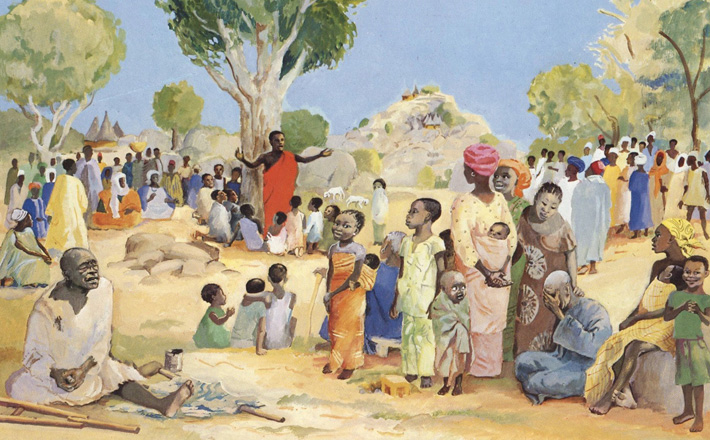Commentary on Matthew 5:1-12
Happiness has become a science in recent decades.
Neurochemistry, brain studies, and the ever-present consumer sciences, have tried to describe and prescribe a sort of anatomy of happiness. Algorithms determine which ads pop up on your web browser to appeal to your daily happiness quota.
We want to be happy. We think we should be happy. We are often shocked to find out that what we want does not make us happy. It might be an interesting exercise to ask your congregation to think of a time they were happy (a day, an event), and ponder what about the experience produced happiness.
In the church and in Christian life, we can be very confused about happiness. Will joining a church make me happy? Will following Jesus make me happy? What if I join a church and follow Jesus but I’m still not happy?
In these opening verses of Matthew 5, Jesus teaches about “blessedness,” a word tough to get at in the English language and in American culture. The “blessed” are not the “happy” in the sense used in consumer culture to describe pleasure.
The Greek word used here, makarios, has a semantic range that includes fortunate, happy, privileged. Happiness and blessedness may overlap but they are not identical. Indeed, as Jesus describes those who are “blessed,” it’s hard to see “happiness” written on any of these lives. So what is Jesus talking about?
Jesus begins this teaching, not with promises of happiness, but with promises of blessedness even, and perhaps most, in hard human experiences of mourning, meekness, peacemaking, persecution, and poverty of spirit. Jesus’ form of “blessedness” only makes sense in light of the kingdom of God. Jesus’ teaching here begins and ends with the kingdom of God (verses 3 and 10). Jesus had already preached that “the kingdom of heaven has come near” (4:17). The kingdom sets a new frame of reference for “blessedness.”
Within God’s life (kingdom) “blessedness” does not depend on wealth or health or status. It is not a reward for righteousness or duty. Rather, blessedness is God’s sheer gift. In the realm of God, life is not governed by honor and shame, but by the promise of abundant life. Mourning, poverty of spirit, and meekness reveal this inbreaking of God’s abundant life. When we have “eyes to see” our lives within the kingdom of God, it’s like pushing the reset button.
Take the first beatitude, for example. Poverty of spirit bears within it the blessing of life abundant. When one is poor in heart and mind, one is emptied, we are free of clutter, available and roomy. When we are “wealthy in spirit,” we are full of ourselves, eager to display how much we know, how much we can do. Or we are filled up with multi-tasking, preoccupied by busy-ness.
There is “no room in the inn” for God to do a new thing. Blessed, then, are the poor in spirit, these ones not so full of themselves. They show us open lives, available for the mercy that re-orders life in the reign of God. Mercy is the currency of the kingdom of heaven.
Some preachers avoid “kingdom of God” language altogether because it’s a political and theological minefield. I want to address it here to encourage preachers to do more than just avoid it.
“Kingdom of God” is a rich image that Jesus uses as short hand to convey a full-blown re-ordering of reality. It’s packed with layers and textures, so it’s okay if you can’t find the one, perfect phrase that sufficiently carries its weight in English. Play around with it, push yourself to clarify what “kingdom of God” means, and then translate it in ways that are compelling for your folks.
This is not to diminish concerns about the vocabulary of “kingdom.” We justifiably object to describing the eschatological life of God with an image so burdened by the crimes of empire. Plus, the term carries patriarchal and hierarchical overtones. “Kings” get a rather bad rap in the Old Testament, New Testament and Church History — do we really want to load God’s inbreaking mercy with all that baggage? A frequent substitute, “reign of God,” while more gender neutral, doesn’t get us much further from this corrupt record.
For me, the central theological objection is that “kingdom” language misleads about the very nature of the eschatological life of God. Most of us have never lived in a “kingdom,” that is, under a monarchy, so the word “kingdom” removes us from our everyday, concrete lives into the fairytale world of kings and knights, princesses and castles. “Kingdom” makes God’s life sound far away and long ago.
The words “kingdom of heaven” further remove God’s life to something “up there,” ethereal and disconnected from making breakfast or taking the bus to work. At worst, “kingdom” is a static, motionless state waiting our arrival. At best, a happy place we visit occasionally, like Disneyland. “Kingdom” language rarely points us to the disruptive, abundant life Jesus promises. Still, it is the language we have received, and I want to find ways to use it faithfully.
What language functions best in your own context to describe new life in God for the whole world in Jesus’ name? Maybe you will use the phrase “kingdom of God,” or “household of God,” or “God’s way of life,” or find something more vivid. Remember this is not about political correctness. It is about being sure you are preaching the good news, giving folks ways to step into this amazing divine life that Jesus announces is near.
Lastly, a word about Epiphany. As we move from Jesus’ birth to his baptism to the Sermon on the Mount, the picture of Jesus starts to take shape. We begin to see more and more clearly this Jesus of Nazareth, this God Incarnate, and the new way of life he proclaims. Not only in the manger, but also in Jesus’ teaching, God is revealed. In the ways this kingdom works, the way this household is run, in its values and priorities, God is made known.
This revelation of God’s life is an invitation that calls for a response. If we choose to follow Jesus into God’s abundant life, we will conform to the way this kingdom works, its values and priorities. We are born and reborn into new relationship with God, each other and creation. Jesus invites us: Repent and follow. Repent and follow. Repeat. Kingdom life is a responsive life, always seeking, always moving.


February 2, 2014